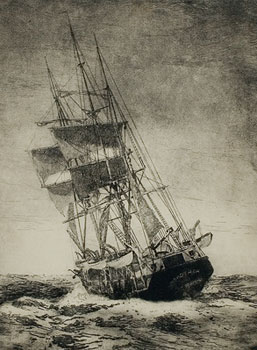 Una canzone del mare ma non una sea shanty in senso stretto, attribuita a Mervyn Vincent di Padstow (Cornovaglia). Detto anche “The Padstow Shanty.” o più comunemente “The Farewell shanty” “One version of the story states that Vincent discovered the words in an old chap book and set music to it. After he introduced it to the Stable Loft Folk Club he led, it spread throughout the maritime song community. Others say that its discoverer was Alan Molyneaux, who found it tucked away in a book as he was doing research at Plymouth Library.” (Tratto da qui)
Una canzone del mare ma non una sea shanty in senso stretto, attribuita a Mervyn Vincent di Padstow (Cornovaglia). Detto anche “The Padstow Shanty.” o più comunemente “The Farewell shanty” “One version of the story states that Vincent discovered the words in an old chap book and set music to it. After he introduced it to the Stable Loft Folk Club he led, it spread throughout the maritime song community. Others say that its discoverer was Alan Molyneaux, who found it tucked away in a book as he was doing research at Plymouth Library.” (Tratto da qui)
E’ chiaramente un lament o un canto dell’addio in cui chi sta per morire (o è ormai vecchio) saluta questo mondo e si imbarca per un viaggio verso l’altro mondo. Il tema della barca funeraria non è insolita nell’iconografia celtica (anche se si riscontra in molte civiltà coeve oppure antecedenti).
“The ship or boat is a feminine image – we still call ships ‘she’ and in times passed there was a tradition of adorning the prows of ships with the images of various goddesses. Therefore, it might be deduced that the ship or boat (whatever its size) acts as a protector for the travellers. Moreover, seafaring vessels also have been found in burial mounds, sometimes votive boats made out of gold as have been found in North Wales and Broighter in County Derry, Ireland.” (tratto da qui)
Perdersi in mare, andare alla deriva per acque sconosciute, equivale a percepire la morte come una rinascita
ASCOLTA Assasin’s Creed
It’s time to go now,
Haul away your anchor,
Haul away your anchor,
It’s our sailing time.
Get some sail upon her,
Haul away your halyards(1),
Haul away your halyards.
It’s our sailing time.
Get her on her course now,
Haul away your foresheets(2),
Haul away your foresheets,
It’s our sailing time.
Waves are surging under,
Haul away down Channel,
Haul away down Channel,
On the evening tide.
When your sailing’s over,
Haul away for Heaven,
Haul away for Heaven,
God be by your side.
It is time to go now,
Haul away your anchor,
Haul away your anchor,
It’s our sailing time.
NOTE
1) halyard: una drizza è una cima o un cavo che si usa per issare una vela
2) foresheet: scotta del fiocco: serve per manovrare una vela, anzi una particolare vela detta fiocco, ossia la vela di forma triangolare posta a prua
TRADUZIONE ITALIANO DI CATTIA SALTO
E’ tempo di andare, issa la tua ancora è il nostro tempo per navigare. Mettici una vela sopra, via, ala le tue drizze falla andare per la sua rotta ora via ala la tua scotta del fiocco, le onde sono impetuose al di sotto, via, naviga per il Canale, nella marea della sera. Quando la tua navigazione è alla fine naviga verso il cielo, che il Signore ti stia accanto, è l’ora di andare adesso issa la tua ancora è il nostro tempo per navigare!
ASCOLTA OZ Folklounge una versione molto malinconica (la voce dello shantyman è vellutata e profonda, molto intensa)
FONTI
https://blueloulogan.wordpress.com/2012/10/13/songs-of-logan-5-farewell-shanty-padstowe-shanty/comment-page-1/
http://mudcat.org/thread.cfm?threadid=149625
http://mudcat.org/thread.cfm?threadid=18455
